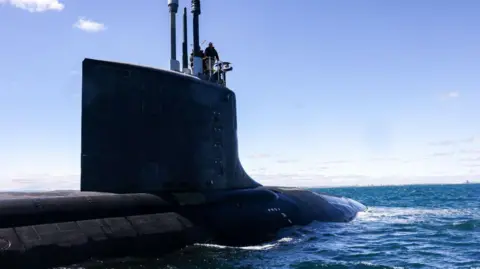 Getty Images
Getty ImagesA multibillion-dollar submarine deal between longtime allies Australia, Britain and the United States has been thrust into the spotlight after the Trump administration said it was done. an analysis of how the deal fits into the much-touted “America First” agenda..
The Aucus Security Pact, Australia's largest defense project, is set to play a key role in the country's ability to replace its aging Collins-class submarine fleet and, crucially, its military position in the region.
The review is led by chief adviser to the US Secretary of Defense Elbridge Colby, who has previously criticized Aucus. In a speech last year, he questioned why the US was giving away “this crown jewel when we need it most.”
A Defense Department spokesman said the purpose of the review was to ensure that “this initiative from the previous administration was consistent with the President's America First agenda.”
Fears that the review could derail the deal were played down by Britain and Australia, which said the review was a normal process when a new government takes power.
And during a meeting between US President Donald Trump and his Australian counterpart Anthony Albanese on Monday, Trump said the deal was “full steam ahead.”
What is Aukus?
The Aukus agreement, billed as a trilateral security partnership worth £176 billion ($239 billion; A$368 billion) over 30 years, includes two so-called pillars.
The first direction is the supply of nuclear submarines.
Australia will buy three used Virginia-class submarines from the US from 2032, with an option to buy two more.
After this, it is planned to design and build a completely new model of a nuclear submarine for the navies of Great Britain and Australia.
This attack ship will be built in the UK and Australia to a British design, but using technology from all three countries.
Australia has pledged $3 billion to boost the pace of U.S. submarine production, and officials said payments remain on schedule despite the review.
The second component concerns the cooperation of allies in their “enhanced capabilities.” This involves sharing military expertise in areas such as long-range hypersonic missiles, underwater robotics and artificial intelligence.
What is the purpose of the deal?
At its core, the agreement is believed to be aimed at countering China's growing presence in the Indo-Pacific region and its role in rising tensions in disputed areas such as the South China Sea.
While none of the allies directly pointed to China as the reason for the agreement, the three countries said regional security concerns had “grown significantly” in recent years.
China condemned the agreement as “grossly irresponsible” when it was first announced.
Foreign Ministry spokesman Zhao Lijian said it “seriously undermines regional peace and stability and intensifies the arms race.”
Who was it that negotiated?
There was a deal presented in September 2021 three former leaders: Australian Scott Morrison, British Boris Johnson and American Joe Biden.
Britain revised the security pact last year after Sir Keir Starmer's Labor government won the general election.
What does Australia get from this?
For Australia, the deal represents a major upgrade to its military capabilities. The country will become the second country after Britain to receive Washington's elite nuclear propulsion technology.
Such submarines will be able to operate further and faster than the country's existing diesel fleet. It will also mean Australia will be able to strike enemies over long distances for the first time.
Under the agreement, Royal Australian Navy sailors will be sent to US and UK submarine bases to train in the use of nuclear submarines.
What will the UK and US get from this?
From 2027, the pact will allow the US and UK to station a small number of nuclear submarines in Perth, Western Australia.
It will also create around 7,000 jobs in the UK, and the design and construction of a new fleet of nuclear submarines will take place in the UK.
The benefits for the United States are less clear, but sharing its defense technology could give the country an opportunity to expand its presence in the Asia-Pacific region.
Washington and Downing Street have historically seen Australia's armament as essential to maintaining peace in a region far removed from their own.








